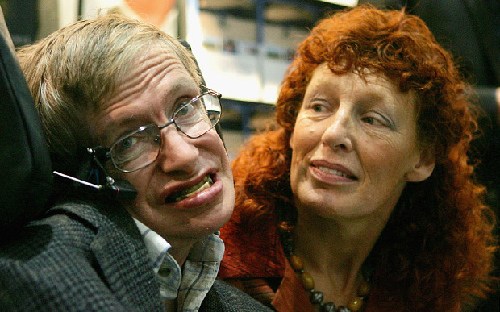
Professor Stephen Hawking (L) and his wife Elaine Mason
霍金:若無貢獻會安樂死
Stephen Hawking would 'consider' assisted suicide if he was a burden
Professor Stephen Hawking, the physicist, would consider assisted suicide if he felt he had nothing more to contribute to the world and was merely a burden, he has said.
物理學家史蒂芬•霍金教授曾表示,如果他覺得自己無法再對這個世界做出任何貢獻,而僅僅是別人的負擔,那么他會考慮協助自殺.
Prof Hawking, who has motor neurone disease, has argued that keeping someone alive against their own wishes is the "ultimate indignity", saying he would think about it in the event he was suffering great pain.
霍金患有運動神經元?銜綣鶉瞬幌牖鈄?卻非逼著別人活著,這是對他人"最大的侮辱".他曾表示,如果他遭受了巨大的痛苦,那么他會考慮協助自殺.
In an interview with Dara O'Briain, for a new BBC programme, the world-renowned scientist disclosed he suffered bouts of loneliness, because people can be afraid to talk to him or let him answer.
在接受BBC一個新節目的主持人達拉•奧布萊恩采訪時,這位舉世聞名的科學家透露,人們害怕和他交談或者向他提問,因此他正承受著巨大的孤獨.
In 2013, he offered his public support to the discussion of assisted dying, saying: "We don't let animals suffer, so why humans?"
2013年,他公開支持安樂死,并聲稱:"我們都不忍心讓動物遭受痛苦,那為什么要讓人們忍受呢?"
In a programme to be broadcast on BBC One on June 15, Prof Hawking will offer further insights into his own life, alongside interviews with his children.
6月15日BBC1臺將播出對霍金先生及其子女的訪談,霍金將剖析他對自己生命更深沉的感悟.
When asked by O'Briain about his support for assisted dying, and what condition he would have to be in to consider it for himself, the physicist said: "To keep someone alive against their wishes is the ultimate indignity.
















































